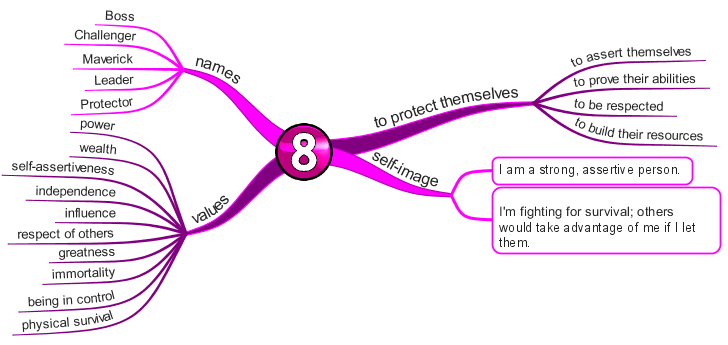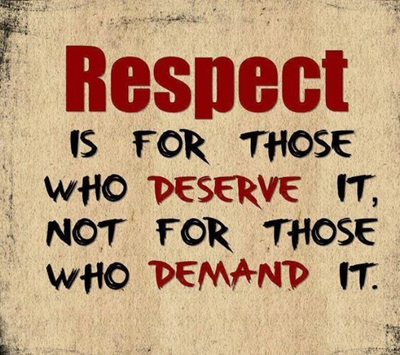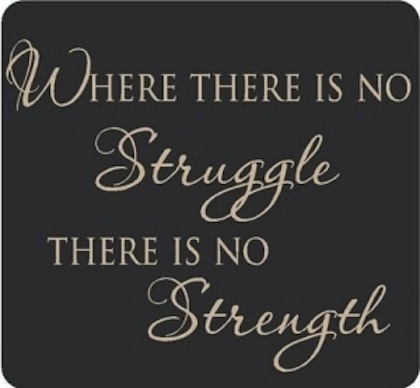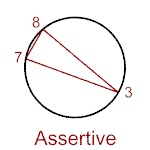Personality Type Eight

Overview
Eights like to see themselves as strong, assertive people who are in control. They don't want others to control them; they want to determine their own course in life. They seek independence from the influence of others, demanding that they get the autonomy they want. They also feel a strong need to protect themselves, others who are close (e.g., family), their achievements, and their legacy.

In order to protect themselves, they direct their energy into creating boundaries around themselves. Within this sphere of influence, they are in control. Beyond the boundary lie others looking for weakness in the Eight, ready to take away their strength and accomplishments. Eights are wary of others and defend themselves against such threats.

Eights are very passionate people. They have a strong and an attitude that compels them to take action. They act out their desires impulsively, feeling that their instinctual energy guides them to safety.

Eights are searching for survival. Survival includes physical survival, but it also includes their legacy. They want their environment to reflect themselves. They work hard on projects that build their legacy and reputation. In a sense, a legacy that lasts forever is a type of immortality -- the ultimate survival.

Eights want to ensure that others don't influence or affect them. Eights try to expand their sphere of influence, thrusting it out aggressively into their environment, seeking to control and dominate it. After all, if I control my environment, it can't control me. Unfortunately for the Eight, others stand in the way and may not always yield their power.
Average
Average Eights see themselves as the leader. They are the strong ones who will take charge and on whom others can depend. They provide for others, placing them in a position of superiority.

They are shrewd, pragmatic, and enterprising. They are natural entrepreneurs who have the street smarts and intuition to make things happen. They have a vision, the initiative, and decisiveness to see it through.

Average Eights tend to be blunt; they don't beat around the bush. In addition, Eights would prefer others would be equally to the point. Eights sometimes have a strong, booming voice that sounds like they are shouting (perhaps, a subtle reminder to show who's in control).

Eights hind it hard to relax if not in control. They have to keep their guard up to hide their vulnerabilities, including their emotions which Eights associate with weakness.

Average Eights believe that they don't need others and that they can be completely independent. They want to show others that they are in charge. Sometimes that means they have to boast, gloat, and bluff to show their strength. Showing their power wards others off who the Eight believes might otherwise take advantage of them.

Average Eights have a strong appetite for life and experience and want to feel the intensity of their experiences. They want to feel strong, energetic, and alive. They enjoy the adrenaline rush of their risky adventures and challenges, believing that they're tough enough not to get hurt.

Average Eights need to push against others and get worked up so they feel the intensity of their situation. They are stimulated by conflict. They enjoy challenging others; debating to get an intense conversation. They push their limits and test the boundaries of others: how far will others let them go? They want others to push back, to know where others stand.

Although Eights feel they are merely being assertive and taking charge, but others find average Eights truly aggressive: they are critical, confrontational, argumentative and angry. Eights can be very demanding, pressuring and bullying others to do what they want. Others often question how constructive the Eight's leadership really is and may decide to leave. At this point, however, fear and intimidation is a tactic that keeps people loyal.

Average Eights are very concerned with losing their power and have to push back defiantly and willfully to ensure that they remain in charge. They deliver ultimatums. They openly threaten others to challenge them.

At their Worst
Eights become unhealthy when they feel that they must stay in control, even if it means using violence to keep others at bay. They feel invincible and all powerful. If they feel like they are truly losing their power, they will destroy whatever they have lost so that others cannot win.

What leads Eights down the wrong path is their strong identification with their own strength and independence from others. This identification always leads to an attitude of being against others.
At their Best
Healthy Eights have let go of their forced will and forced strength; they no longer have to push to get things done. They stand up for themselves, for others, and for what they want. Their assertiveness is a natural leadership and leads to taking care of others. They are not threatened by the strength and independence of others. Instead, they try to nurture those qualities in others.

Healthy Eights are resourceful and determined. They act as mentors, sponsors and providers. They seek an atmosphere of justice and fairness.

At their best, Eights let go of the belief that they must always be in control of their environment. They are extremely self-confident and courageous, standing up for others and their principles. They are strong and empowering, yet gentle and compassionate. They are in harmony with the Will and Direction of the Universe, no longer asserting themselves against it. Surrendering to the Universe give us its strength.

Analysis
Every personality type is "powered" by a different motivation. When "worn lightly," this motivation guides our behaviour through general tendencies and attachments. As this motivation becomes stronger, it becomes increasingly important to see ourselves in a certain way and to ensure that others see us that way, too. To accomplish this goal, we emphasize certain behaviours (and disown others) by playing a role. Sometimes we need to manipulate others or even undermine them to force them to see us as we want to be seen. Unfortunately, the more attached we become to our self-image, the less we see ourselves as we really are.
 |
Motivation
To protect themselves and to be in control of their own lives |

 |
Attachment
Become attached to values of strength, self-assertion, and independence
Self-Image: “I am a strong, assertive person.”
Reject their vulnerable side (emotional needs) |

 |
Self-Esteem
Feel good about themselves when they are strong and in control.
Relate to others primarily by leading, being decisive and providing. |

 |
Role
Prove self-image through their Social Role of the Rock/Leader - the protector who takes charge
Tend to think that they are completely self-sufficient |

 |
Manipulation
Manipulate others by dominating others and insisting they obey.
Shadow Issue of Lust arises when Eights want to possess and control and want intensity in their experiences. |

 |
Overcompensation
Undermine the security and safety of others by threatening to harm or control others. |
Similarities with other Types

Eights seek autonomy (like Ones and Nines)
Read More
|
|

Eights are assertive in going after what they want (like Threes and Sevens)
Read More
|
| |
|
|
|

Eights handle problems with a reactive approach (like Fours and Sixes)
Read More
|
|

Eights tend to reject their own needs (like Twos and Fives)
Read More
|
Interviews with Eights





























